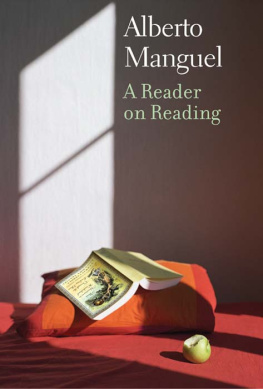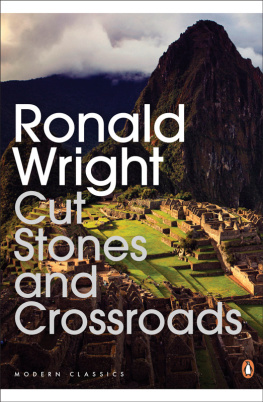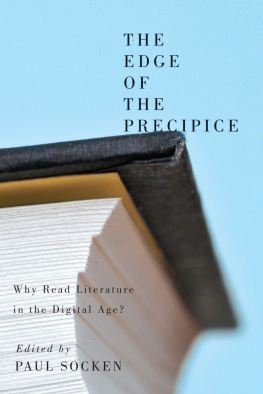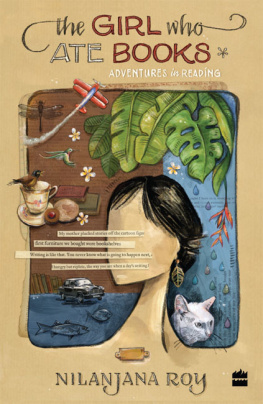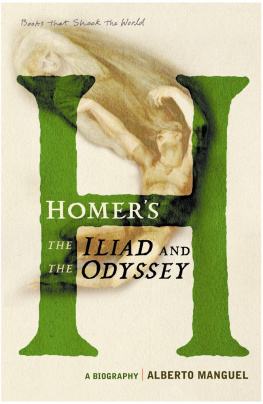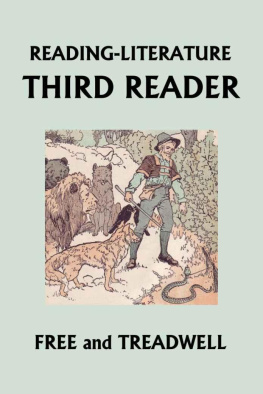A Reader on Reading
Alberto Manguel
A Reader
on Reading
Yale UNIVERSITY PRESS
New Haven and London
Published with assistance from the Mary Cady Tew
Memorial Fund.
Copyright 2010 Alberto Manguel.
All rights reserved.
This book may not be reproduced, in whole or in part,
including illustrations, in any form (beyond that copying
permitted by Sections 107 and 108 of the U.S. Copyright
Law and except by reviewers for the public press), without
written permission from the publishers.
Designed by Sonia Shannon
Set in Fournier type by Tseng Information Systems, Inc.
Printed in the United States of America.
Library of Congress Cataloging-in-Publication Data
Manguel, Alberto.
A reader on reading / Alberto Manguel.
p. cm.
Includes bibliographical references and index.
ISBN 978-0-300-15982-0 (alk. paper)
1. Books and reading. 2. Manguel, Alberto
Books and reading. I. Title.
z1003.M2925 2010
028.9dc22
2009043719
A catalogue record for this book is available from the British
Library.
This paper meets the requirements of ANSI/NISO z39.48
1992 (Permanence of Paper).
10 9 8 7 6 5 4 3 2 1

To Mavis Gallant,
always in search of the evidence.
Give your evidence, said the King; and dont be nervous, or Ill have you executed on the spot.
Alices Adventures in Wonderland, Chapter 11
Contents
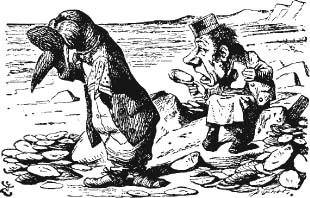
Preface
You ought to return thanks in a neat speech, the Red Queen said,
frowning at Alice as she spoke.
Through the Looking-Glass, Chapter 9
THE SUBJECT OF THIS BOOK, as of almost all my other books, is reading, that most human of creative activities. I believe that we are, at the core, reading animals and that the art of reading, in its broadest sense, defines our species. We come into the world intent on finding narrative in everything: in the landscape, in the skies, in the faces of others, and, of course, in the images and words that our species creates. We read our own lives and those of others, we read the societies we live in and those that lie beyond our borders, we read pictures and buildings, we read that which lies between the covers of a book.
This last is of the essence. For me, words on a page give the world coherence. When the inhabitants of Macondo were afflicted with an amnesia-like sickness which came to them one day during their hundred years of solitude, they realized that their knowledge of the world was quickly disappearing and that they might forget what a cow was, what a tree was, what a house was. The antidote, they discovered, lay in words. To remember what their world meant to them, they wrote out labels and hung them from beasts and objects: This is a tree, This is a house, This is a cow, and from it you get milk, which mixed with coffee gives you caf con leche. Words tell us what we, as a society, believe the world to be.
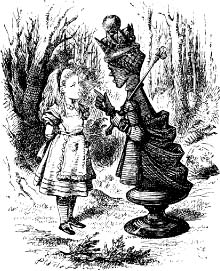
Believe to be: therein lies the challenge. Pairing words with experience and experience with words, we, readers, sift through stories that echo or prepare us for an experience, or tell us of experiences that will never be ours, as we know all too well, except on the burning page. Accordingly, what we believe a book to be reshapes itself with every reading. Over the years, my experience, my tastes, my prejudices have changed: as the days go by, my memory keeps reshelving, cataloguing, discarding the volumes in my library; my words and my world except for a few constant landmarks are never one and the same. Heraclituss bon mot about time applies equally well to my reading: You never dip into the same book twice.
What remains invariable is the pleasure of reading, of holding a book in my hands and suddenly feeling that peculiar sense of wonder, recognition, chill, or warmth that for no discernible reason a certain string of words sometimes evokes. Reviewing books, translating books, editing anthologies are activities that have provided me with some justification for this guilty pleasure (as if pleasure required justification!) and sometimes even allowed me to make a living. It is a fine world and I wish I knew how to make 200 a year in it, wrote the poet Edward Thomas to his friend Gordon Bottomley. Reviewing, translating, and editing have sometimes allowed me to make those two hundred pounds.
Henry James coined the phrase the figure in the carpet for the recurrent theme that runs through a writers work like a secret signature. In many of the pieces I have written (as reviews or memoirs or introductions) I think I can see that elusive figure: it has something to do with how this art I love so much, the craft of reading, relates to the place in which I do it, to Thomass fine world. I believe there is an ethic of reading, a responsibility in how we read, a commitment that is both political and private in the act of turning the pages and following the lines. And I believe that sometimes, beyond the authors intentions and beyond the readers hopes, a book can make us better and wiser.
In the neat speech returning thanks, I want to acknowledge the generous reading of Ileene Smith and Susan Laity, the careful proofreading of Dan Heaton, and the meticulous indexing of Marilyn Flaig. Also the splendid cover design of Sonia Shannon.
Craig Stephenson, who for the past twenty years has been the first reader of everything Ive written, suggested the structure, order, and selection for this book (as he did earlier for Into the Looking-Glass Wood, the 1998 volume from which a few of the essays here included were taken, as well as a few of the lines in this preface). He curbed my inclination to keep occasional pieces to which I was attached for sentimental reasons, reminded me of others that I had forgotten but insisted that I revise certain paragraphs or examples that now seemed dated, and spent far more time reflecting on the appropriateness of each piece than I myself, in my impatience, would have done. For this, and for more things than he would ever be willing to acknowledge, my loving thanks.
PART ONE
Who Am I?
I am real! said Alice, and began to cry.
You wont make yourself a bit realer by crying,
Tweedledee remarked: theres nothing to cry about.
If I wasnt real, Alice saidhalf-laughing through her tears, it all seemed so ridiculous I shouldnt be able to cry.
I hope you dont suppose those are real tears?
Tweedledum interrupted in a tone of great contempt.
Through the Looking-Glass, Chapter 4

A Reader in the
Looking-Glass Wood
Would you tell me, please, which way I ought to go from here?
That depends a good deal on where you want to get to, said the Cat.
Alices Adventures in Wonderland, Chapter 6
WHEN I WAS EIGHT OR NINE, in a house that no longer stands, someone gave me a copy of Alices Adventures in Wonderland and Through the Looking-Glass. Like so many other readers, I have always felt that the edition in which I read a book for the first time remains, for the rest of my life, the original one. Mine, thank the stars, was enriched by John Tenniels illustrations and was printed on thick, creamy paper that reeked mysteriously of burnt wood.
Next page
